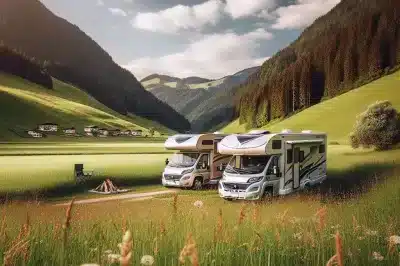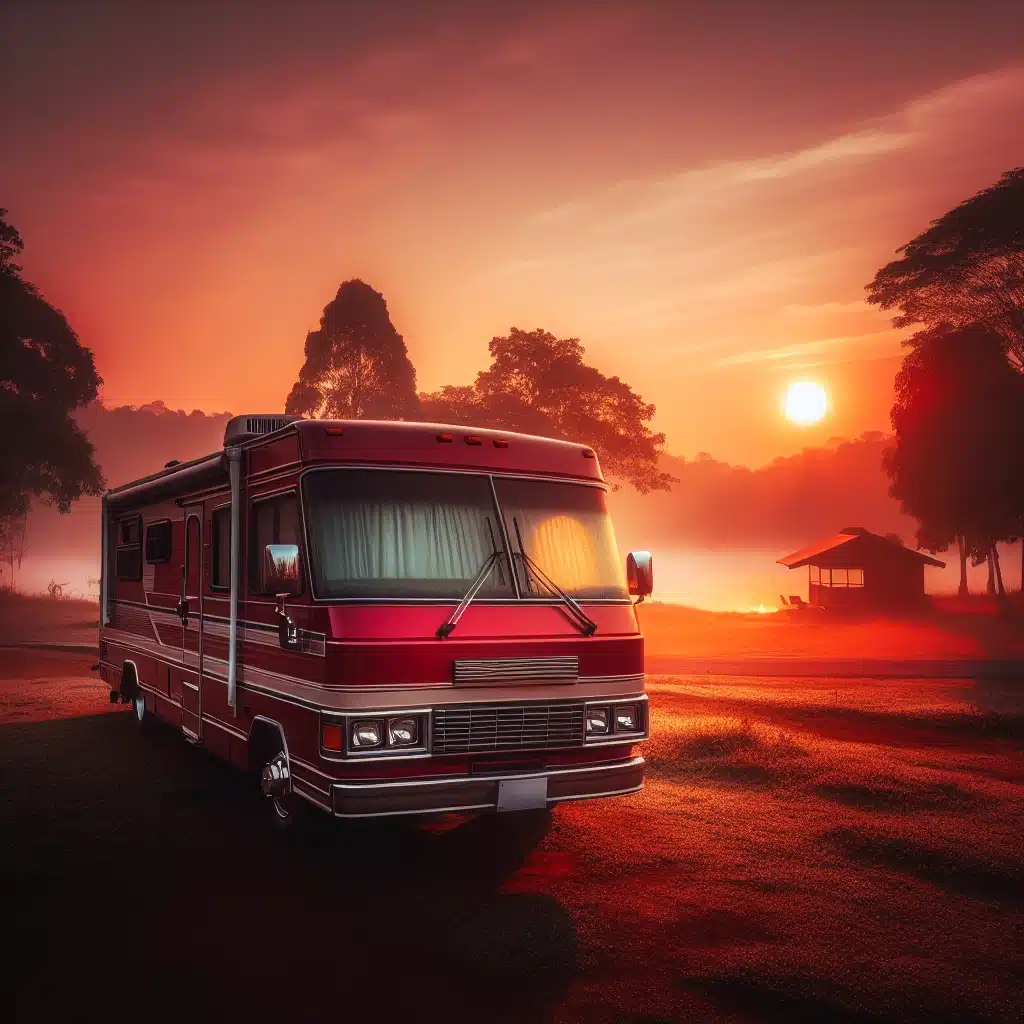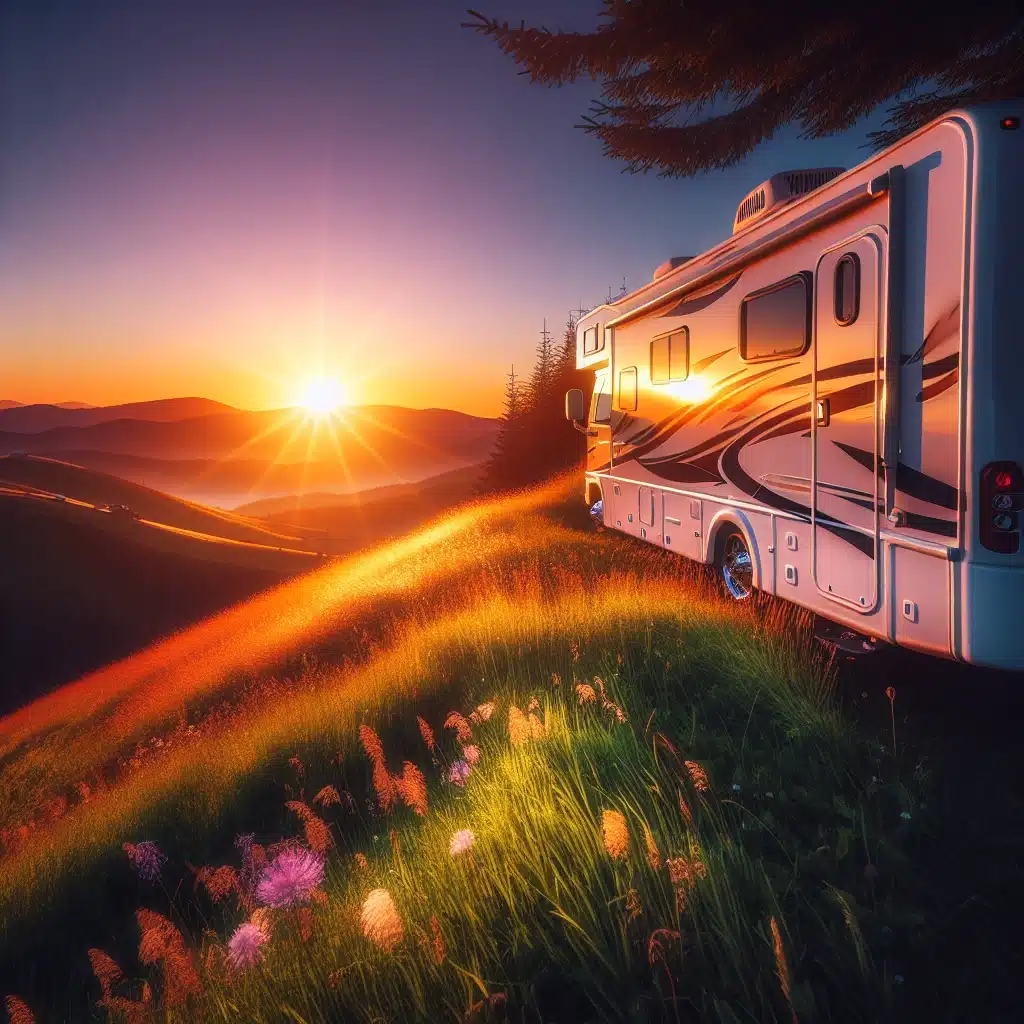Table of Contents

Key Takeaways: Harnessing the Sun’s Power for Your Wilderness Journeys
- Understand the essentials of solar power for off-grid camping.
- Learn how to calculate your energy needs for your next adventure.
- Discover the top solar system picks for different outdoor needs.
- Gain insights on why solar energy is a smart choice for campers and RV enthusiasts.
- Get practical tips on choosing and maintaining the best solar setup for your RV.
Solar Energy: Powering Your Adventures Beyond the Grid
Imagine this: You’re miles away from civilization, surrounded by the serenity of nature, and your RV is humming along with all the comforts of home, powered purely by the sun. Solar energy is not just an eco-friendly choice; it’s a ticket to freedom for campers and RV owners. It lets you explore without being tethered to power outlets, and it’s a silent companion that doesn’t disturb the peace of the great outdoors.
Why Go Solar for Camping and Off-Grid Life?
Going solar means you can keep your gadgets charged, your lights on, and your fridge running without relying on noisy generators or the need to find powered campsites. It’s a clean energy source that reduces your carbon footprint, and after the initial setup costs, the sun’s energy is absolutely free. Plus, with advancements in technology, solar systems are more powerful and accessible than ever.
Understanding Solar System Basics
Before diving into the world of solar power, it’s crucial to grasp a few basics. A solar setup typically includes solar panels, a charge controller, a battery bank, and an inverter. Panels collect sunlight and convert it into electricity. The charge controller regulates the power, the battery stores it, and the inverter turns it into a form you can use to power your RV’s appliances.
Calculating Your Energy Needs
How much solar power do you need? It all comes down to your energy consumption. Start by listing all the devices and appliances you’ll use, noting their wattage and how many hours you’ll run them each day. Add it all up, and you’ve got a daily watt-hour total. This number guides you in choosing the right size of solar panels and battery capacity to ensure you have enough power for your needs.

Top Picks: The Best Solar Systems for Your Outdoor Escapades
Now, let’s talk about the solar systems that stand out from the crowd. Whether you’re a weekend warrior or a full-time off-grid enthusiast, there’s a solar solution that fits your lifestyle. I’ve spent countless hours under the sun and stars, testing and evaluating solar systems to bring you the best picks for your outdoor adventures.
1. High-Efficiency Portable Panels
When space is at a premium and every ounce matters, high-efficiency portable panels are the go-to choice. These panels pack a punch, delivering more power per square inch than standard models. They’re ideal for keeping your batteries topped up during day trips or weekend getaways. Look for panels with monocrystalline cells—they’re the secret ingredient for that high-efficiency magic.
2. Compact Solar Kits for Minimized Footprints
For those who prefer a neat package, compact solar kits offer a hassle-free solution. These kits often come with everything you need—panels, controller, cables, and connectors. They’re easy to set up and take down, making them perfect for campers who move frequently. Plus, their small footprint makes them a breeze to store, leaving you more room for adventure gear.
3. Rugged Solar Setups for the Toughest Environments
If your journeys take you to the wilder side of the world, you’ll need a solar setup that can withstand a bit of rough and tumble. Rugged solar systems are built to endure harsh conditions—think dust, rain, and the occasional bump. They often feature reinforced frames and durable panels, ensuring your power source keeps going as long as you do.
4. Integrated Solar Solutions with Power Stations
For a truly seamless experience, integrated solar solutions with power stations are the way forward. These systems combine solar charging capabilities with a high-capacity battery and multiple output options. It’s an all-in-one power hub that can handle everything from charging phones to running small appliances, making it a versatile companion for any off-grid escapade.
5. Budget-Friendly Solar Options for Cost-Conscious Campers
Solar power doesn’t have to break the bank. There are plenty of budget-friendly options that provide reliable energy without the hefty price tag. Polycrystalline panels are a cost-effective alternative, and while they’re slightly less efficient, they can still meet the needs of many campers. Keep an eye out for deals and you might just snag a solar bargain.
How to Choose the Perfect Solar Companion
With so many options on the market, how do you pick the perfect solar system for your RV? It comes down to understanding your specific needs. Consider how often you’ll be using it, the types of environments you’ll be in, and what devices you need to power. Balance efficiency with portability, and always opt for durability—your solar companion should be as resilient as you are on your adventures.
Assessing Portability and Setup Ease
When you’re eager to explore the great outdoors, the last thing you want is a solar system that’s a chore to set up. Portability is key, especially if you’re frequently on the move. Look for lightweight panels with foldable designs or carrying cases. Some systems even have kickstands or mounting options that make setup a breeze. Remember, the easier it is to set up, the more likely you’ll use it to its full potential.
Compatibility with Your Devices and Appliances
Your solar system should be a matchmaker, seamlessly connecting with the devices and appliances you rely on. Ensure the power output suits your needs—whether it’s USB ports for smartphones or larger connectors for kitchen appliances. Some solar systems come with a variety of adapters, while others might require additional purchases. It’s all about finding the right fit for your tech.
Durability and Weather Resistance for Lasting Use
The great outdoors can be unforgiving, and your solar system needs to take whatever comes its way. Durability is non-negotiable. Opt for panels with sturdy frames and protective casing. Weather resistance is equally important—look for waterproof or water-resistant ratings. A system that’s built to last is an investment in countless adventures to come.

Installation and Maintenance: Keeping Your Solar System at Peak Performance
Proper installation and maintenance are the secret ingredients to a solar system that keeps on giving. It’s not just about getting the best equipment; it’s about taking care of it. A well-maintained solar setup can provide years of reliable service, powering your off-grid life and keeping you connected to the world, even when you’re far from it.
Step-by-Step Setup Guide
Setting up your solar system doesn’t have to be complicated. Start by finding the perfect spot with maximum sun exposure. Unfold or mount your panels and connect them to the charge controller, then link the controller to your battery bank. Finally, connect the inverter to the battery, and you’re ready to plug in your devices. It’s a simple process that pays off with endless energy.
Regular Maintenance Tips and Tricks
To keep your solar system in top shape, regular maintenance is a must. Keep your panels clean from dust and debris to ensure they’re absorbing as much sunlight as possible. Check connections for corrosion or wear and tear, and make sure your battery is properly charged to avoid reducing its lifespan. A little TLC goes a long way in the world of solar power.
Troubleshooting Common Solar Power Issues
Even the best solar systems can hiccup on occasion. Maybe your panels aren’t charging the battery as they should, or the power output isn’t what you expected. Often, the fix is simpler than you think. First, check all connections to make sure they’re secure and corrosion-free. Inspect your panels for any dirt or shading that might be blocking sunlight. Remember, regular maintenance is key to preventing these issues in the first place.
Real-Life Applications: Solar Power in Action
Solar power isn’t just theory; it’s a game-changer for many adventurers. Across deserts, forests, and everything in between, solar energy is proving its worth. Let’s look at how real-life users are harnessing this incredible resource to power their dreams and discover freedom on their terms.
Case Studies: Adventurers Who Have Made the Switch
Take Sarah and John, a couple who decided to live full-time in their RV. They installed a solar system and haven’t looked back. With 300 watts of solar panels on their roof, they can sustain their daily energy needs, including running a small fridge, LED lights, and charging their electronics. They’ve found that with careful energy management, they can stay off-grid for weeks at a time, exploring the wilds without a generator’s hum.
Maximizing Solar Power During Different Weather Conditions
Solar power isn’t just for sunny days. Even when the weather turns, there are ways to make the most of your system. In overcast conditions, your panels will still generate power, albeit at a reduced rate. To compensate, you can conserve energy by using appliances less frequently or switching to energy-saving modes. And when the sun’s out, make sure your panels are angled correctly to soak up every ray.
Frequently Asked Questions (FAQ)
Got questions? You’re not alone. Here are some of the most common queries I hear from fellow solar enthusiasts. If you’re pondering a solar setup for your RV or camping adventures, these answers might just shed some light on the subject.
What happens to the excess energy my solar panels generate?
Excess energy generated by your solar panels is usually stored in your battery bank. If the batteries are full, the charge controller will prevent overcharging. Some systems may allow you to redirect excess energy to other uses, such as heating water.
How do I know if my RV is ‘solar ready’?
An RV that is ‘solar ready’ typically has pre-installed wiring and components to simplify the installation of solar panels. Check with your RV manufacturer or consult your owner’s manual to determine if your RV has these features.
Can I install a solar system on my RV myself?
Many RV owners successfully install solar systems themselves, especially if they choose a kit designed for DIY installation. However, if you’re not comfortable with electrical systems, it’s wise to hire a professional to ensure everything is set up safely and correctly.
What should I do if my solar panels get damaged while camping?
If your solar panels get damaged, assess the extent of the damage first. Minor scratches may not affect performance significantly, but cracks or breaks can compromise the system. If repairs are needed, it’s best to consult with the manufacturer or a professional solar technician.
Do solar panels require a lot of maintenance?
Solar panels are relatively low maintenance. The most important task is to keep them clean and free of debris, which can block sunlight and reduce efficiency. Regular visual inspections and gentle cleaning with a soft cloth or brush are usually sufficient.
By answering these questions, we hope to have provided you with a clearer understanding of how solar power can enhance your camping experiences. If you’re ready to take the plunge into solar, remember that the journey is as rewarding as the destination. Enjoy the process of becoming more sustainable and self-sufficient, and may the sun always shine on your adventures!
- Boondocking RVs: Flexible Solar Solutions – 3 March 2024
- Renewable Energy Tips for Full-Time Boondocking RVers – 2 March 2024
- Boondocking Solar Power Systems: Sizing Options & Solutions for Motorhomes – 1 March 2024
